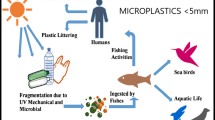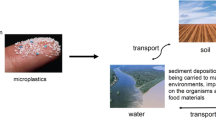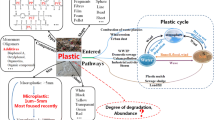Abstract
In recent years, there has been an increase in research to understand the consequences of microplastic contamination. A subset of this research assesses the interaction of microplastics with metals and the subsequent effects of the resulting microplastic-metal complexes in freshwater environments. While our understanding of how microplastics behave in freshwater remains largely unknown, our knowledge of metal behavior in those same environments is well-established. The behavior (partitioning, speciation, bioavailability) of metals is highly dependent on environmental characteristics, including water quality variables such as hardness, pH, and dissolved organic matter. This study reveals that despite our understanding of metal behavior, there is little consideration for these influential factors in the current body of microplastic-metal research. Multiple instances highlighted throughout this study show that even when similar plastic, metal, and biota are utilized, there are conflicting observations as to whether the mixture is toxic; we stress that without adequate reporting of environmental conditions, these contradictions are likely to persist without explanation. Through justification of water quality characteristics known to influence metal behavior, this study proposes a framework of reporting requirements for all future microplastic-metal research.

Similar content being viewed by others
References
Allen S, Allen D, Phoenix VR et al. (2019) Atmospheric transport and deposition of microplastics in a remote mountain catchment. Nat Geosci 12:339–344. https://doi.org/10.1038/s41561-019-0335-5
Alsop D, Wilson JY (2019) Waterborne pharmaceutical uptake and toxicity is modified by pH and dissolved organic carbon in zebrafish. Aquat Toxicol 210:11–18. https://doi.org/10.1016/j.aquatox.2019.02.008
Baken S, Degryse F, Verheyen L et al. (2011) Metal complexation properties of freshwater dissolved organic matter are explained by its aromaticity and by anthropogenic ligands. Environ Sci Technol 45:2584–2590. https://doi.org/10.1021/es103532a
Barber LB, Murphy SF, Verplanck PL et al. (2006) Chemical loading into surface water along a hydrological, biogeochemical, and land use gradient: a holistic watershed approach. Environ Sci Technol 40:475–486. https://doi.org/10.1021/es051270q
Berggren D (1990) Speciation of cadmium(II) using donnan dialysis and differential-pulse anodic stripping voltammetry in a flow-injection system. Int J Environ Anal Chem 41:133–148. https://doi.org/10.1080/03067319008027356
Bianchi TS (2006) Characterization of organic matter. Oxford University Press.
Blair RM, Waldron S, Gauchotte-Lindsay C (2019) Average daily flow of microplastics through a tertiary wastewater treatment plant over a ten-month period. Water Res 163:114909. https://doi.org/10.1016/j.watres.2019.114909
Burrows SD, Frustaci S, Thomas KV, Galloway T (2020) Expanding exploration of dynamic microplastic surface characteristics and interactions. TrAC Trends Anal Chem 130:115993. https://doi.org/10.1016/j.trac.2020.115993
Caruso G (2019) Microplastics as vectors of contaminants. Mar Pollut Bull 146:921–924. https://doi.org/10.1016/j.marpolbul.2019.07.052
Chen W, Guéguen C, Smith DS et al. (2018) Metal (Pb, Cd, and Zn) binding to diverse organic matter samples and implications for speciation modeling. Environ Sci Technol 52:4163–4172. https://doi.org/10.1021/acs.est.7b05302
de Ruijter VN, Redondo-Hasselerharm PE, Gouin T, Koelmans AA (2020) Quality criteria for microplastic effect studies in the context of risk assessment: a critical review. Environ Sci Technol 54:11692–11705. https://doi.org/10.1021/acs.est.0c03057
DeForest DK, Meyer JS (2015) Critical review: toxicity of dietborne metals to aquatic organisms. Crit Rev Environ Sci Technol 45:1176–1241. https://doi.org/10.1080/10643389.2014.955626
Ding L, Mao R, Ma S et al. (2020) High temperature depended on the ageing mechanism of microplastics under different environmental conditions and its effect on the distribution of organic pollutants. Water Res 174:115364. https://doi.org/10.1016/j.watres.2020.115634
Environmental Monitoring Systems Laboratory (1996) Determination of trace elements in waters and wastes by inductively coupled plasma—mass spectrometry. In: Methods for the Determination of Metals in Environmental Samples. Elsevier, pp 88–145
Fu W, Franco A, Trapp S (2009) Methods for estimating the bioconcentration factor of ionizable organic chemicals. Environ Toxicol Chem 28:1372–1379. https://doi.org/10.1897/08-233.1
Ge Y, Sauvé S, Hendershot WH (2005) Equilibrium speciation of cadmium, copper, and lead in soil solutions. Commun Soil Sci Plant Anal 36:1537–1556. https://doi.org/10.1081/CSS-200059044
Gong J, Xie P (2020) Research progress in sources, analytical methods, eco-environmental effects, and control measures of microplastics. Chemosphere 254:126790. https://doi.org/10.1016/j.chemosphere.2020.126790
Hildebrandt L, Au M, von der, Zimmermann T et al. (2020) A metrologically traceable protocol for the quantification of trace metals in different types of microplastic. PLOS One 15:e0236120. https://doi.org/10.1371/journal.pone.0236120
Kalčíková G, Skalar T, Marolt G, Jemec Kokalj A (2020) An environmental concentration of aged microplastics with adsorbed silver significantly affects aquatic organisms. Water Res 175:115644. https://doi.org/10.1016/j.watres.2020.115644
Kim D, Chae Y, An Y-J (2017) Mixture toxicity of nickel and microplastics with different functional groups on Daphnia magna. Environ Sci Technol 51:12852–12858. https://doi.org/10.1021/acs.est.7b03732
Lam B, Baer A, Alaee M et al. (2007) Major structural components in freshwater dissolved organic matter. Environ Sci Technol 41:8240–8247. https://doi.org/10.1021/es0713072
Leiser R, Wu G-M, Neu TR, Wendt-Potthoff K (2020) Biofouling, metal sorption and aggregation are related to sinking of microplastics in a stratified reservoir. Water Res 176:115748. https://doi.org/10.1016/j.watres.2020.115748
Liu G, Zhu Z, Yang Y et al. (2019) Sorption behavior and mechanism of hydrophilic organic chemicals to virgin and aged microplastics in freshwater and seawater. Environ Pollut 246:26–33. https://doi.org/10.1016/j.envpol.2018.11.100
Long KE, Van Genderen EJ, Klaine SJ (2004) The effects of low hardness and pH on copper toxicity to Daphnia magna. Environ Toxicol Chem 23:72–75. https://doi.org/10.1897/02-486
Luo H, Zhao Y, Li Y et al. (2020) Aging of microplastics affects their surface properties, thermal decomposition, additives leaching and interactions in simulated fluids. Sci Total Environ 714:136862. https://doi.org/10.1016/j.scitotenv.2020.136862
Mammo FK, Amoah ID, Gani KM et al. (2020) Microplastics in the environment: Interactions with microbes and chemical contaminants. Sci Total Environ 743:140518. https://doi.org/10.1016/j.scitotenv.2020.140518
Moermond CTA, Kase R, Korkaric M, Ågerstrand M (2016) CRED: Criteria for reporting and evaluating ecotoxicity data. Environ Toxicol Chem 35:1297–1309. https://doi.org/10.1002/etc.3259
Murphy KR, Butler KD, Spencer RGM et al. (2010) Measurement of dissolved organic matter fluorescence in aquatic environments: an interlaboratory comparison. Environ Sci Technol 44:9405–9412. https://doi.org/10.1021/es102362t
Namieśnik J, Rabajczyk A (2010) The speciation and physico-chemical forms of metals in surface waters and sediments. Chem Speciat Bioavailab 22:1–24. https://doi.org/10.3184/095422910X12632119406391
Nelson H, Benoit D, Erickson R, et al. (1986) Effects of variable hardness, ph, alkalinity, suspended clay, and humics on the chemical speciation and aquatic toxicity of copper. Environmental Protection Agency, Duluth, MN (USA). Environmental Research Lab.
Page MJ, McKenzie JE, Bossuyt PM, et al. (2021) The PRISMA 2020 statement: an updated guideline for reporting systematic reviews. BMJ n71. https://doi.org/10.1136/bmj.n71
Pagenkopf GK (1983) Gill surface interaction model for trace-metal toxicity to fishes: role of complexation, pH, and water hardness. Environ Sci Technol 17:342–347. https://doi.org/10.1021/es00112a007
Pärt P, Svanberg O, Kiessling A (1985) The availability of cadmium to perfused rainbow trout gills in different water qualities. Water Res 19:427–434. https://doi.org/10.1016/0043-1354(85)90033-8
Playle RC, Dixon DG, Burnison K (1993) Copper and cadmium binding to fish gills: Modification by dissolved organic carbon and synthetic ligands. Can J Fish Aquat Sci 50:2667–2677. https://doi.org/10.1139/f93-290
Renner R (1997) Rethinking water quality standards for metals toxicity. Environ Sci Technol 31:466A–468A. https://doi.org/10.1021/es972517p
Rozman U, Turk T, Skalar T et al. (2021) An extensive characterization of various environmentally relevant microplastics—material properties, leaching and ecotoxicity testing. Sci Total Environ 773:145576. https://doi.org/10.1016/j.scitotenv.2021.145576
Sarijan S, Azman S, Said MIM, Jamal MH (2020) Microplastics in freshwater ecosystems: a recent review of occurrence, analysis, potential impacts, and research needs. Environ Sci Pollut Res Int. https://doi.org/10.1007/s11356-020-11171-7
Schlesinger WH, Bernhardt ES (2013) Inland Waters. In: Schlesinger WH, Bernhardt ES (eds) Biogeochemistry (Third Edition). Academic Press, Boston, pp 275–340.
Seidensticker S, Grathwohl P, Lamprecht J, Zarfl C (2018) A combined experimental and modeling study to evaluate pH-dependent sorption of polar and non-polar compounds to polyethylene and polystyrene microplastics. Environ Sci Eur 30:30. https://doi.org/10.1186/s12302-018-0155-z
TenBrook PL, Tjeerdema RS, Hann P, Karkoski J (2009) Methods for deriving pesticide aquatic life criteria. In: Whitacre DM (ed) Reviews of environmental contamination and toxicology. Volume 199. Springer US, Boston, MA, pp 1–92.
Thomas JD (1997) The role of dissolved organic matter, particularly free amino acids and humic substances, in freshwater ecosystems. Freshw Biol 38:1–36. https://doi.org/10.1046/j.1365-2427.1997.00206.x
Thornton Hampton LM, Bouwmeester H, Brander SM et al. (2022) Research recommendations to better understand the potential health impacts of microplastics to humans and aquatic ecosystems. Microplastics Nanoplastics 2:18. https://doi.org/10.1186/s43591-022-00038-y
Tunali M, Uzoefuna EN, Tunali MM, Yenigun O (2020) Effect of microplastics and microplastic-metal combinations on growth and chlorophyll a concentration of Chlorella vulgaris. Sci Total Environ 743:140479. https://doi.org/10.1016/j.scitotenv.2020.140479
Unsworth ER, Warnken KW, Zhang H et al. (2006) Model predictions of metal speciation in freshwaters compared to measurements by in situ techniques. Environ Sci Technol 40:1942–1949. https://doi.org/10.1021/es051246c
Varanasi U, Gmur DJ (1978) Influence of water-borne and dietary calcium on uptake and retention of lead by coho salmon (Oncorhynchus kisutch). Toxicol Appl Pharmacol 46:65–75. https://doi.org/10.1016/0041-008X(78)90137-0
Wang F, Yang W, Cheng P et al. (2019) Adsorption characteristics of cadmium onto microplastics from aqueous solutions. Chemosphere 235:1073–1080. https://doi.org/10.1016/j.chemosphere.2019.06.196
Wang Q, Zhang Y, Wangjin X et al. (2020) The adsorption behavior of metals in aqueous solution by microplastics effected by UV radiation. J Environ Sci 87:272–280. https://doi.org/10.1016/j.jes.2019.07.006
Wang Z, Fu D, Gao L et al. (2021) Aged microplastics decrease the bioavailability of coexisting heavy metals to microalga Chlorella vulgaris. Ecotoxicol Environ Saf 217:112199. https://doi.org/10.1016/j.ecoenv.2021.112199
Werbowski LM, Gilbreath AN, Munno K et al. (2021) Urban stormwater runoff: a major pathway for anthropogenic particles, black rubbery fragments, and other types of microplastics to urban receiving waters. ACS EST Water 1:1420–1428. https://doi.org/10.1021/acsestwater.1c00017
Wren CD, Stephenson GL (1991) The effect of acidification on the accumulation and toxicity of metals to freshwater invertebrates. Environ Pollut 71:205–241. https://doi.org/10.1016/0269-7491(91)90033-S
Yao J, Wen J, Li H, Yang Y (2022) Surface functional groups determine adsorption of pharmaceuticals and personal care products on polypropylene microplastics. J Hazard Mater 423:127131. https://doi.org/10.1016/j.jhazmat.2021.127131
Yuan W, Zhou Y, Chen Y et al. (2020) Toxicological effects of microplastics and heavy metals on the Daphnia magna. Sci Total Environ 746:141254. https://doi.org/10.1016/j.scitotenv.2020.141254
Zitko V, Carson WG (1976) A mechanism of the effects of water hardness on the lethality of heavy metals to fish. Chemosphere 5:299–303. https://doi.org/10.1016/0045-6535(76)90003-5
Acknowledgements
This work was supported by the Natural Sciences and Engineering Research Council of Canada Postgraduate Scholarship program (held by LZ) and Discovery Grants program (held by GGP).
Author information
Authors and Affiliations
Contributions
The study conception, design, material preparation, data collection and analysis were performed by Lauren Zink. Gregory G. Pyle provided commentary and guided review on previous versions of the manuscript. All authors read and approved the final manuscript.
Corresponding author
Ethics declarations
Conflict of interest
The authors declare no competing interests.
Additional information
Publisher’s note Springer Nature remains neutral with regard to jurisdictional claims in published maps and institutional affiliations.
Supplementary Information
Rights and permissions
Springer Nature or its licensor (e.g. a society or other partner) holds exclusive rights to this article under a publishing agreement with the author(s) or other rightsholder(s); author self-archiving of the accepted manuscript version of this article is solely governed by the terms of such publishing agreement and applicable law.
About this article
Cite this article
Zink, L., Pyle, G.G. A proposed reporting framework for microplastic-metal mixtures research, with emphasis on environmental considerations known to influence metals. Ecotoxicology 32, 273–280 (2023). https://doi.org/10.1007/s10646-023-02634-x
Accepted:
Published:
Issue Date:
DOI: https://doi.org/10.1007/s10646-023-02634-x




